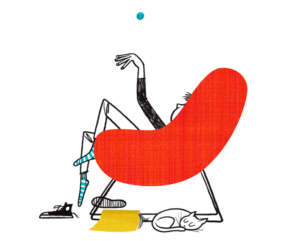这篇文章由Elan Cohen撰写,是我们第七届年度学生编辑大赛中学组的前三名获奖者之一,我们收到了1,242份参赛作品。

里奥·埃斯皮诺萨
“Harnessing Boredom in the Age of Coronavirus”
By Elan Cohen, age 14, F.A. Day Middle School, Newton, Mass.
We all get bored frequently: waiting in line at Starbucks, riding the bus to school, sitting at home with nothing to do. It is inevitable, especially during this time of physical distancing, and it is not going away anytime soon. But if it happens so often, why do we tirelessly try to counteract it? Maybe, instead of avoiding the daydreaming and mind-wandering, we should be embracing it.
A study published in the journal “Science” showed what people would do when they were by themselves for six to 15 minutes and given two choices: do nothing or self-administer mild electric shocks. The findings were astonishing: two-thirds of the men and one-fourth of the women chose to shock themselves rather than be bored.
Do we crave external stimulation so intently that hurting ourselves is preferable to being alone with our own thoughts? Have we forgotten what it is like to be inside our own minds?
A few weeks into quarantine, I decided to take a walk around the woods near my house, with no destination or direction in mind. I saw a swan sitting on her nest, gently tending to some fragile twigs; an old beehive high up in a tree; another swan flying above the river like a bullet, wings just barely grazing the water; and a serene grove of trees on the waterfront with a circular stone path all around, the perfect spot for a picnic. I climbed up a tree and sat there for many minutes, simply observing the shimmering lake and the swaying trees. I never would have noticed these beautiful marvels of nature had it not been for my aimless wandering, and I never would have been able to appreciate my surroundings so fully had it not been for my mindful boredom. I learned that it is possible to be both bored and happy at the same time; the two emotions are not mutually exclusive.
Contrary to the media-manipulated messages we get from modern society, it is healthy to let our minds wander every once in a while. Our brains are host to vast stockpiles of deep thoughts, honest emotions, nostalgic memories and wildly creative ideas just waiting to be exploited. When we use boredom as a tool to tune in to our deepest internal selves, we unlock all those hidden elements, becoming more connected with ourselves and the world around us.
So next time you find yourself at home with nothing to do (which will happen a lot over the next couple months), remember that it is OK to be bored. Try being content with following the crazy stream of thoughts inside your own head because you never know what you might find.
Works Cited
Paul, Pamela. “Let Children Get Bored Again.” The New York Times, 2 Feb. 2019.
Razzetti, Gustavo. “Why Boredom Is So Powerful in Your Life.” Liberationist, Accessed 30 March 2020.
Webb, Jonathan. “Do people choose pain over boredom?” BBC News, 4 July 2014.
Wilson, Timothy D., et al. “Just think: The challenges of the disengaged mind.” Science. 4 July 2014.